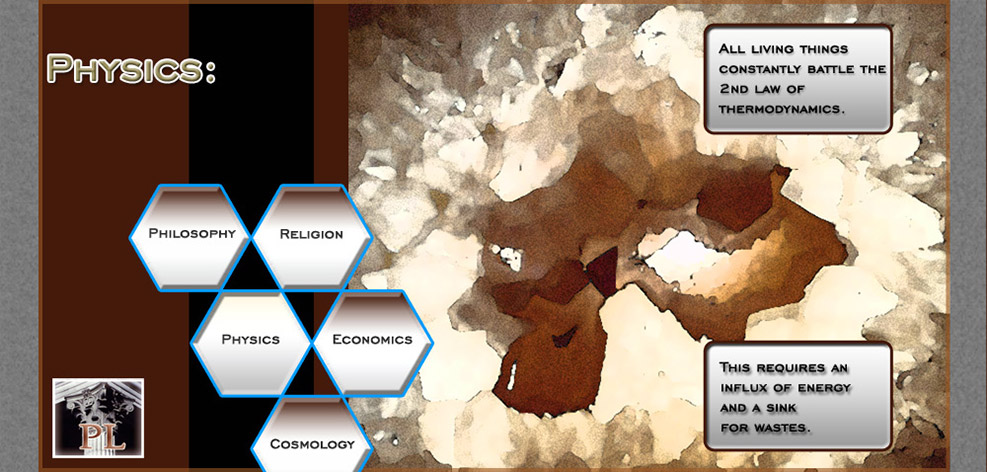
Tools for Real Democracy
Our aim with this page is to get the reader up to speed with physics as quickly and easily as possible.
To begin with, let's think a bit about why this is an especially worthwhile goal.
Physics, with cosmology, is the most foundational of the sciences.
Our concept of the basic nature of reality derives from our understanding of physics and, above all, quantum mechanics.
While physics has a reputation for being abstruse, nothing is more relevant to our everyday concerns. At the foundation of economics and ecology alike are principles such as the second law of thermodynamics. Even the rife political corruption around climate destruction and energy companies can be traced, in a sense, to such basic physical laws. Our understanding, too, of biology and psychology has been strongly shaped by way in which physics has been conceived — as misconceived.

The average individual has little idea where energy, as consumed by human beings, actually comes from. As all forms of illiteracy do, this has led to exploitation of public fears and concerns. There is, for example, much talk about energy independence, but no amount of domestic drilling (or mining) of any substance could achieve such a thing indefinitely. That's why the mantra "Drill, baby, drill," is dumb, baby, dumb. Moreover, using the wrong technologies to generate energy can lead both to massive pollution and to further climate destruction.
Energy independence could be readily achieved by kicking solar thermal electricity technology into high gear, but again, the average individual has never even heard of this technology. And that's no accident. You aren't supposed to know anything about it.
Not only would greater public understanding of physics make for better energy policy, it would also, indirectly, make for better medical policy. The most fundamental of all diseases, though it still goes unrecognized as such by the medical establishment, is the aging process itself. And the aging process is essentially a manifestation of the second law of thermodynamics. Similarly, the wheels of commerce turn primarily because of the need of all organisms for energy in order to run the processes of life, such as metabolism. Thus, at a bare minimum, democracy itself demands that we raise our level of awareness of basic physical principles.
More abstractly, basic physical principles do much to shape our understanding of the nature of reality itself, including human reality. Thus, physics provides part of the comprehensive orientation to reality that human beings have long, and rightly, sought.
As with any subject, the best place to begin is with with a broad overview of the topic, ideally one with significant visual interest.
Admirably well-suited to this purpose is Super Simple Physics, from Dorling Kindersley (for which a set of flash cards is also available). SSP covers the entire gamut of physics topics in the span of 288 pages with the barest possible minimum of mathematics.
To get a little more hands-on with what the reader has learned to this point, we recommend that the student acquire one or more of the Engino kits. These can be used to concretely manipulate numerous fundamental physical laws. An especially good starting point would be the "Newton's Laws" kit, which covers inertia, momentum, and kinetic and potential energy. A kit leading on to an understanding of engineering is "Simple Machines". While having the appearance of toys, the instructional material provided with these kits is of real value, even for adults.
With this material mastered, we suggest that readers interested in learning more continue with a rather old book, which has, however, dated remarkably well: The Elements and Structure of the Physical Sciences, by Julien A. Ripley, Jr. Why this one, exactly, even in the face of many, more recent competitors? Well, because of its orientation (and, beside, the elements of the physical sciences haven't changed all that much in the intervening years). Here's what Julien himself had to say about that: "[The book] is primarily an exposition of the major concepts and theories of physical science, covering both their logical structure and the empirical evidence validating that structure. It is, additionally, an attempt to set these ideas into a broad historical and philosophical context. The understanding of science and its relation to our culture requires much more than the mastery of scattered principles, a few theories, an assortment of facts, and a handful of formulas into which the facts are fitted."
We couldn't have said it better, and we do not know of another introduction of physics that brings these indispensable concerns (or the prerequisite knowledge base) to the table.
More advanced topics than those discussed to this point will require additional mathematical preparation. Some of that expertise is taught specifically within the context of learning physics in our recommendations below, but the reader desiring more thorough understanding should consult our Mathematical Literacy resource.
The Theoretical Minimum by Leonard Susskind and George Hrabovsky continues where Ripley leaves off, providing a more in-depth treatment of core topics, including the mathematics that are pre-requisite. Rather astonishingly, both integral and differential calculus are capably treated here in short compass. The book is appropriately subtitled What You Need to Know to Start Doing Physics. And so it is.
Next up is Quantum Mechanics: The Theoretical Minimum. Quantum mechanics accounts for the most fundamental elements of physical reality. It is a rather bewildering discipline, even for physicists themselves. To join in that bewilderment, this is the best place to continue.
Third in this series is Special Relativity and Classical Field Theory: The Theoretical Minimum. While quantum mechanics deals with the realm of the very small, special relativity and classical field theory give us much of our understanding of the grand order of things, encompassing electromagnetism, gravitation, and space and time. The effort to mutually accommodate quantum mechanics, special relativity, gravitation, and electromagnetism is still underway, and indeed constitutes one of the most important frontiers of science. Ideally, such an accomodation would ultimately provide a "TOE" - that is, a "theory of everything".
Standing somewhat apart from both quantum mechanics and special relativity, and yet profundly relevant to both, is thermodynamics. Thermodynamics deals with the flow of energy, and hence has bearing upon topics ranging from chemistry to the physics of time, and curiously enough, even evolution and the subject of information.
The elements of thermodynamics, with minimal mathematical treatment, may be found in The Refrigerator and the Universe, by Martin Goldstein and Inge F. Goldstein. As this book eschews both calculus and statistics, which are essential to the subject, the reader may wish to continue with Understanding Thermodynamics, by H. C. Van Ness, which includes the math missing in the Goldsteins' book.
The Editor / Everything Progressive